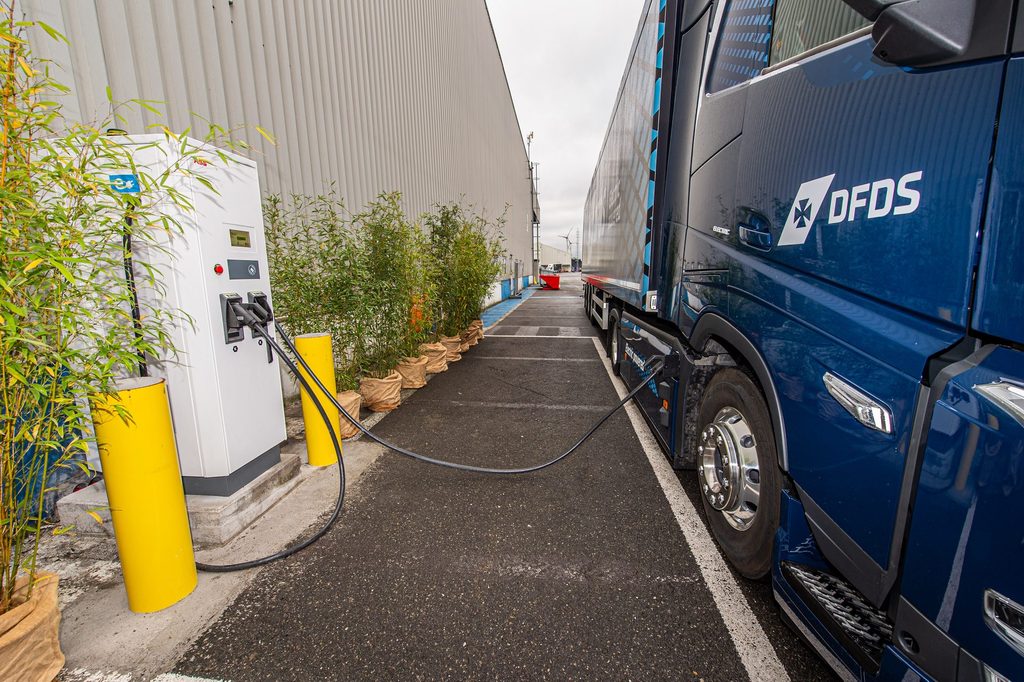Companies across Flanders now receive subsidies from the regional authorities for the installation of new charging stations for electric trucks, De Tijd reports.
Since the start of the year, companies located in Flanders have been able to apply for subsidies to install these charging points, in anticipation of a large-scale roll-out of electric trucks in the coming years. Companies are eligible to be reimbursed for 20% of their total investment, for a maximum amount of 300,000 per company.
Many companies have been quick to benefit from the generous subsidy. Major employers such as Bpost, Colruyt, bus company Keolis, and charging network operators Allego and Fastned have applied for significant subsidies from the Flemish Region. In total, €6.3 million has been earmarked by the region for truck charging infrastructure, according to Flemish transport minister Lydia Peeters.
Roll-out begins
Unlike the now-defunct subsidies for charging stations for passenger vehicles, as well as smaller trucks and vans, there is no obligation for the charging points to be accessible to the public for at least some of the day. So far, 109 projects have been approved, which should yield over 1,200 new charging stations in the coming years.
In concrete terms, Bpost will receive subsidies for 305 new charging stations across Flanders. These points will help power its fleet of new electric delivery vehicles, albeit with low capacity 22 kilowatt points. Petrol station chain G&V will receive €680,000 for 34 fast chargers for trucks, with a capacity of 400 kilowatts.
The European transport industry is doubling down on its electrification plans. There has been a massive surge in demand for electric trucks. Manufacturer Volvo expects 70% of its new fleet to be electric by 2030. Currently, most cargo deliveries are made by polluting diesel engine vehicles. These benefit from Belgian state subsidies.
Last month, Belgium produced its first fully electric truck on behalf of logistics company Katoen Natie at Volvo Trucks Ghent. It anticipates starting mass production later this year.
In Belgium, deliveries of new electric trucks have already begun. In May, brewing giant AB InBev started deliveries with a 100% electric truck in the Liège area. Last year, DFDS took delivery of its first electric Volvo truck. Coca-Cola has received delivery of a fleet of 30 electric vehicles.
Poor infrastructure
The biggest obstacle to a large roll-out of electric trucks in Belgium is the country’s poor electric charger infrastructure, which already poses problems for ordinary electric vehicle owners.
Related News
- Electric cars: Nearly 2,500 recharging points in Wallonia by 2026
- Brussels to get tough on 'freeloading' at electric car charging stations
For long haul electric trucks, new powerful fast chargers are needed, few of which currently exist in the country. These are expensive to build and require several access points. This cost is often too much to bear for companies in the transportation sector, who already operate on wafer-thin profit margins.
This new investment marks the first foray of the Flemish Region into installation of charging points for freight transport.
Flanders axed its subsidies for charging points on public land for electric vehicles several years ago, but this has not stopped the Flemish network from expanding rapidly. The demand for charging has increased so much that grid operator Fluvius plans to invest €4 billion into strengthening its grid to accommodate them.

